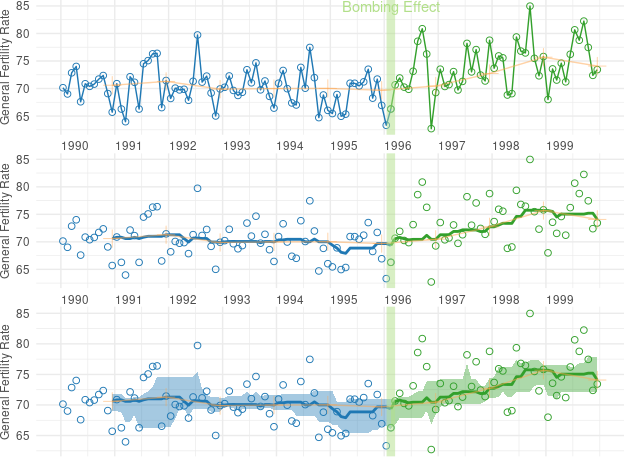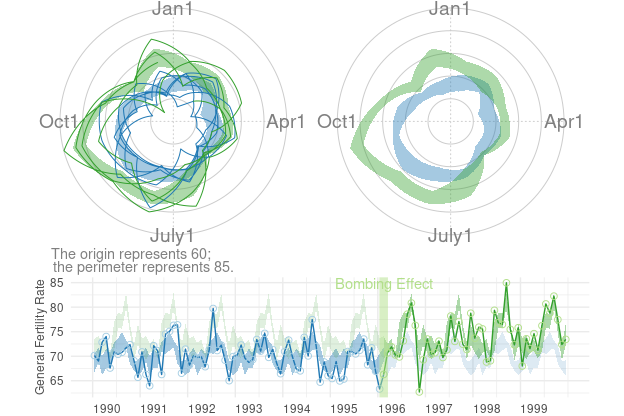
The hardware and bandwidth for this mirror is donated by METANET, the Webhosting and Full Service-Cloud Provider.
If you wish to report a bug, or if you are interested in having us mirror your free-software or open-source project, please feel free to contact us at mirror[@]metanet.ch.
Welcome to the Wats Package. This implements the
approaches described in Joseph
Lee Rodgers, William
Howard Beasley, and Matthew Schuelke (2014). Wrap-around
Time Series Plots (WATS Plots) for Interrupted Time Series Designs:
Applications to Fertility Rates and the Oklahoma City Bombing.
Multivariate Behavioral Research.
The figures can be viewed in the vignettes, or in the Handouts document. The release version of Wats is available on CRAN.
Many data structures, particular time series data, are naturally seasonal, cyclical, or otherwise circular. Past graphical methods for time series have focused on linear plots. In this paper, we move graphical analysis onto the circle. We focus on two methods, one old and one new. Rose diagrams are circular histograms, and can be produced in several different forms using the RRose software system. In addition, we propose, develop, and illustrate a new circular graphical method, called Wrap-Around Time Series Plots (WATS plots) that is useful to support time series analyses in general, but in particular in relation to interrupted time series designs. We illustrate the use of WATS Plots from an interrupted time series design evaluating the effect of the Oklahoma City bombing on birth rates in Oklahoma County during the ten years surrounding the bombing of the Murrah Building in Oklahoma City. We compare WATS Plots to linear time series representations with smoothing. Each method is shown to have advantages in relation to the other; in our example, the WATS Plots more clearly show the existence and effect size of the fertility differential.
Keywords: time series, interrupted time series design, group differences, graphical analysis, circular data, H-spread


When the Wats package is installed on your local machine, the reproduce.R
script starts with our initial datasets (i.e., the vital
statistics birth counts and the US Census population estimates) to
create the derivative datasets and resulting graphs and analysis.
The following directories are not part of the standard R package:
datasets/:
CSV versions of the *.rda data frames officially included in the
package. The incoming/unprocessed files are stored in datasets/raw/.
The processed files are stored in datasets/derived/.documentation-for-developers/:
Notes and links that should help package developers set up on
their computer. Typical package users won’t have a need for
this.publication-graphs/:
A deprecated location that contains loose graphs of older versions of
the manuscript.playgrounds/:
R snippets to help developers experiment with potential new
features.utility/:
R scripts that aren’t incorporated into the package. They help automate
certain tasks, or document how parts of the package were created.The released CRAN version of Wats can be installed through R with.
install.packages("Wats")The latest development version of Wats can be installed from GitHub after installing the remotes package.
install.packages("remotes")
remotes::install_github("OuhscBbmc/Wats")The software is written primarily in R, under the MIT License. The DOI of this major release of the repository is 10.5281/zenodo.11921. (The DOI of the article is 10.1080/00273171.2014.946589.)
Continued development and maintenance of this package supported by the Oklahoma Shared Clinical and Translational Resources (OSCTR, U54GM104938) with an Institutional Development Award (IDeA) from NIGMS. The content is solely the responsibility of the authors and does not necessarily represent the official views of the National Institutes of Health.
| Branch | GitHub Actions | Codecov |
|---|---|---|
| Main | ||
| Dev | ||
| Ubuntu Latest | Test Coverage |
| Key | Value |
|---|---|
| License |  |
| CRAN Version | |
| CRAN Rate | |
| Zenodo Archive | |
| Production Doc | |
| Development Doc |  |
These binaries (installable software) and packages are in development.
They may not be fully stable and should be used with caution. We make no claims about them.